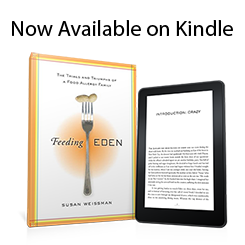A Review – Food Allergies: Traditional Chinese Medicine, Western Science, and the Search for a Cure
 Ten years ago I was drafted unwittingly into the ranks of the food allergy moms. Managing my son’s multiple anaphylactic allergies has been an uphill climb among landmines of questions: Why are there so many new allergies? Why aren’t our kids outgrowing their allergies? Why are food allergies becoming so pervasive … life threatening … scarily unpredictable? And then our plea: Why oh why can’t our doctors cure our children’s food allergies? In Henry Ehrlich’s book, Food Allergies: Traditional Chinese Medicine, Western Science, and the Search for a Cure, he weaves these questions into his detailed telling of the work of Dr. Xiu-Min Li and her quest to save patients from lethal allergic reactions.
Ten years ago I was drafted unwittingly into the ranks of the food allergy moms. Managing my son’s multiple anaphylactic allergies has been an uphill climb among landmines of questions: Why are there so many new allergies? Why aren’t our kids outgrowing their allergies? Why are food allergies becoming so pervasive … life threatening … scarily unpredictable? And then our plea: Why oh why can’t our doctors cure our children’s food allergies? In Henry Ehrlich’s book, Food Allergies: Traditional Chinese Medicine, Western Science, and the Search for a Cure, he weaves these questions into his detailed telling of the work of Dr. Xiu-Min Li and her quest to save patients from lethal allergic reactions.
We food allergy types could fill our bookshelves with cookbooks and lifestyle guides. But there aren’t any books written about the process of procuring food allergy treatments. Equally unique, the subject of Food Allergies: Traditional Chinese Medicine, Western Science, and the Search for a Cure, Dr. Xiu-Min Li, uses Traditional Chinese Medicine to address our distinctly modern challenge. Moreover, Dr. Li aims for the altercation of the immune reaction of allergic individuals. She doesn’t confine herself to the goal of conditioning her patient’s to tolerate food. She hopes to bring them a lasting cure. Her ambition struck me as a somewhat western “in it to win it” attitude. But then I found myself thinking, “What do I know? Maybe she can.” as Henry Ehrlich carefully walks his readers through case studies in which Dr. Li has systematically altered her patient’s reaction to food. By the end of his book, Henry Ehrlich writes Dr. Li’s scientific theories and practices into a story that reveals what her science may have the potential to do so.
Ehrlich walks his readers through the early career choices of a Chinese born, American trained doctor who begins her own journey by connecting the dots between her studies of the symptoms and treatment of parasitic disease in China to the increasingly prevalent symptoms of food induced anaphylaxis. Then, in a distinctly modern laboratory setting she then transforms mice – among the most food tolerant mammals – into her own case studies of peanut induced anaphylaxis. Author Henry Ehrlich calls Dr. Li a “Rosetta Stone” because she can think simultaneously in both systems and recognize the potential of thousands of TCM remedies for treating diseases of the immune system that defy conventional remedies, not just food allergies, but eczema and asthma, and potentially for autoimmune disorders. While reading I was struck by the inherent logic of merging TCM with modern medicine and equally in awe of Henry Ehrlich’s tenacious abilities as writer. He distills complex scientific processes, translating each and every detail into language and constructs for patients, parents and doctors. After reading Food Allergies: Traditional Chinese Medicine, Western Science, and the Search for a Cure I felt I had been given the gift of the possibilities that lie ahead for my own child - an homage of respect from an author who understood that his readers had been waiting for this story of science to unfold.

 What I Do Now:
What I Do Now: